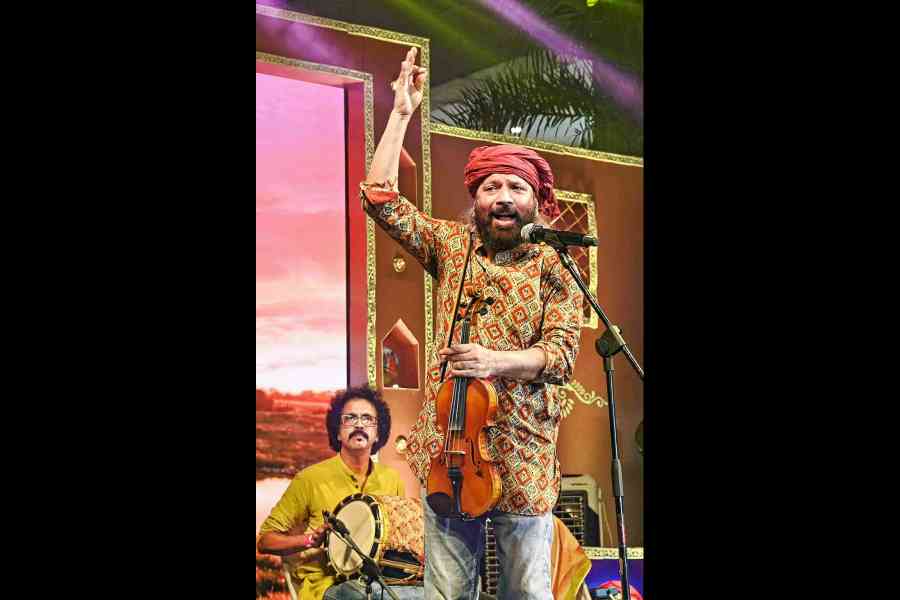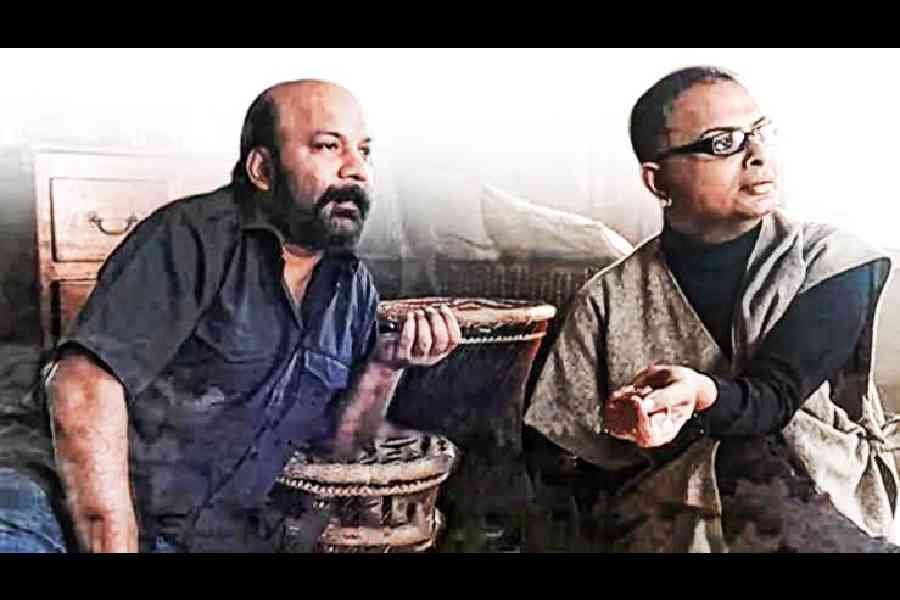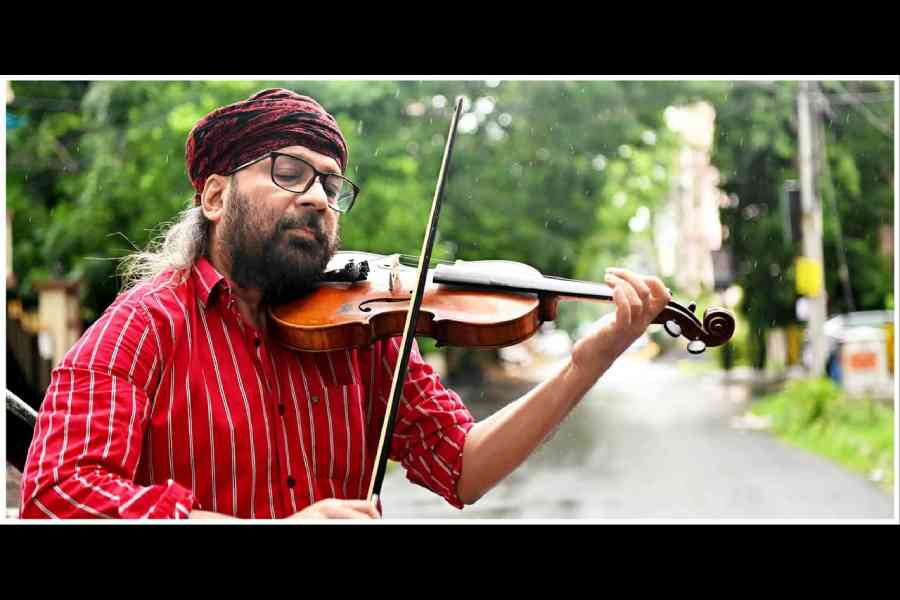It was a stormy and rainy day as I sat with musician Debojyoti Mishra in his Golpark studio for a chat. He sipped on his black coffee that kept getting cold and Bhola kept reheating it. We munched on fish fingers and French fries. He says with warmth, “Please have, they are homemade.” A chat with a musician who has not only worked with names like Shankar Mahadevan and fashion designer Sabyasachi Mukherjee, but one of the few to have continued to make music since his days of working with legends such as Salil Chowdhury, Rituparno Ghosh and Mrinal Sen.
INTRODUCTION TO MUSIC
I ask him about his roots in music and there is immediately nostalgia in his eyes. Who could blame him? He says, “Both my parents were from Bangladesh and I was born here. Growing up in Tollygunge’s famed Colony Para, art and culture were quintessential aspects of our lives. I remember being an adolescent when the Naxalite movement was raging. In the middle of the cacophony that surrounded our lives, music gave a sort of balance and held us close together. On a moonlit night, saris and other clothes are hanging outside to dry on verandahs, the ambience is otherwise silent but there is a man. A man in a white lungi, sticking his ear to the radio as Mozart reaches his ears.”
At the age of 17, he became the breadwinner of the family. “It was a stroke of luck that music became my profession. I was introduced to the violin by my beloved father and I used to play the instrument for a band called Pratidhwani. Before the violin, I learned playing the sarod from Ali Akbar Khan but could not continue since he left the city. Can you imagine a nine or 10-year-old playing English classical music on the violin in a place like Colony Para?” he laughs.
“Anyway, Salil Chowdhury heard me play. I was studying physics at St. Xavier’s College. Salilda approached me and somehow I ended up being his assistant for over a decade. I strongly believe that my father is my biological guardian but Salil Chowdhury is my Baba and Ma. At that juncture when I’m a collegegoer, this man tells me that physics is an ocean… and so is music. I cannot be in two oceans at the same time. Salilda was the string that connected my love for music and it turned into my profession.
“Both these oceans met very beautifully, that is the thing about two oceans, no? Professionally, of course, I chose music.”
LITERATURE
It was not pouring as hard anymore outside. Bhola comes in again to reheat the coffee. “My mother is my base for literature. I still recall her reading books by Satinath Bhaduri, Kamal Kumar Majumdar and Samaresh Bose and then discussing it with her sisters. Baba was a Shakespeare man, he had a world of Shakespeare, George Bernard Shaw, Beethoven, Mozart and the likes of them. Who could believe he worked in a bank for a living,” says Mishra. “We have seen poverty but we have always seen light. We have seen light in poverty and that is something I believe till date, that light is always there at the end of the tunnel.”
THE BANGLADESH CONNECT
“Ah, I am a hero there! (Laughs) Sheikh Hasina knows me as Debu. After Hasina: A Daughter’s Tale, Sheikh Hasina and her sister Sheikh Rehana sang the song Amar shadhna meetilo with me.”
He sings the song in a voice full of grief and strength and adds, “Charubala Mishra, my grandmother, introduced me to her world of keertan. She used to sing Amar shadhna meetilo. Sheikh Mujibur Rahman who was from Faridpur, also used to sing this song. Mrinal Sen and my father were also from the same district. What a place! It has a lot of waterbodies, it rains a lot too and has a different kind of power with a pinch of laziness. Anyway, I have composed and sang for numerous films made in Bangladesh. Faridpur was home to my father. I, however, feel like I’m constantly in migration."

Debojyoti Mishra performing at Mishti Mela 2024 at City Centre New Town, Rajarhat
“I am a Bohemian. I feel like I have no place called home but I have a firefly, my Jonaki (his wife). I always say that I don’t go home, I come to Jonaki. She feels like home.”
SATYAJIT RAY & MRINAL SEN
“He was an exemplary writer, a visionary and everything was in paper when working with Satyajit Ray. He used to always make notes and did his homework before coming to work. There was a certain level of madness in that man. He navigated smoothly through what other filmmakers struggle with, the conversion of thought into cinema. Mrinal Sen is a man of moments. This chat is at such an extraordinary juncture. We have crossed Ray’s centenary year, it is Sen’s 101st birth year and this year marks 100 years of Salil Chowdhury.”
RITUPARNO GHOSH, GULZAR, AISHWARYA RAI BACHCHAN & MORE
Mishra confesses to missing Rituparno Ghosh and recalls the late filmmaker fondly. “He never saw himself as a filmmaker, he believed he was a social commentator. He never considered his own films to be as important as those of Satyajit Ray, Mrinal Sen or Ritwik Ghatak. He was argumentative and always open to criticism. With him, making music would be a matter of minutes. The spontaneity kept us connected. Songs from Titli, Memories in March, Raincoat and all such films were made within minutes. He was prolific in writing. We would sit for addas and music would be made alongside conversations about Rabindranath, paintings and politics. I first worked with Gulzar in Piya tora kaisa abhiman, which was for Ritu’s Raincoat. That is also when I met Aishwarya. She is such a friendly, intelligent, kind, nice and beautiful person. I believe it was Ritu who created that ground for Aishwarya and me to be acquaintances.”

With Rituparno Ghosh
CANNES
In 2007, the 60th Cannes Film Festival screened the Bhavna Talwar directorial Dharm, starring Pankaj Kapur and Supriya Pathak. Mishra was the music director for the film. “Now, Ritu had taken a different film to Cannes that year and just like friends have silent spells, we went through those too. So, at that time Ritu and I were not on talking terms. That day the ice was broken by remembering Satyajit Ray’s dialogue on the Mediterranean.”
BEYOND MUSIC
In the book Ekoda Janhobi Tire, Mishra chronicles the journey of his father Jahnabi Ranjan Mishra, who immigrated to Calcutta from Bangladesh in the ’50s. “The book does not just narrate the story of my father’s journey but also numerous others who went through that pain and much more. The language used in the book is made up with a stream of consciousness.” He takes a sip of his coffee with watery eyes and continues, “In my father’s last seven days, he was in delirium and went back to believing that he was still in Bangladesh. He thought of me to be his younger brother and talked about a flute that was broken by oppressors. He used to cry and tell me that his flute had one less note. To shift lives overnight, not easy. It was after his demise that I wanted to memorialise the struggles of so many people like him.”
“Anyway…”, he straightens up and says with a smile, “Apart from writing, I also paint. I love painting. My paintings have been displayed in renowned galleries. I have also acted in a couple of projects and directors would always require me for comic relief.”
THE FUTURE SHINES BRIGHT
Mishra has written an opera on Salil Chowdhury, Jhorer Thikana, which will be staged in Chicago on July 4. “He had a song which went like, Aami jhorer kaache rekhe gyalam amar theekana. Chowdhury has inspired me heavily. The way his love songs had a sense of revolt... stupendous. Calcutta is the place I love. I would never want to settle outside of Calcutta.”
The man with music, art and culture running through his veins, sang Chawl rastaye as I left the studio. In the post-storm sky, I strangely spotted a rainbow. There is light at the end of the tunnel, after all.










